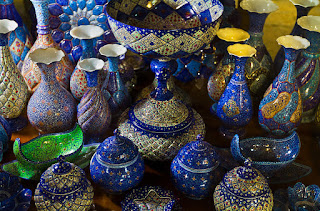Iran culture people food and festivals
ranian Society & Culture
Islam and Shi'ism
Islam is practised by the majority of Iranians and governs their personal, political, economic and legal lives. Islam emanated from what is today Saudi Arabia. The Prophet Muhammad is seen as the last of God's emissaries (following in the footsteps of Jesus, Moses, Abraham, etc) to bring revelation to mankind. He was distinguished with bringing a message for the whole of mankind, rather than just to a certain peoples. As Moses brought the Torah and Jesus the Bible, Muhammad brought the last book, the Quran. The Quran and the actions of the
Prophet (the Sunnah) are used as the basis for all guidance in the religion.
Among certain obligations for Muslims are to pray five times a day - at dawn, noon, afternoon, sunset, and evening. The exact time is listed in the local newspaper each day. Friday is the Muslim holy day. Everything is closed. Many companies also close on Thursday, making the weekend Thursday and Friday.
During the holy month of Ramadan all Muslims must fast from dawn to dusk and are only permitted to work six hours per day. Fasting includes no eating, drinking, cigarette smoking, or gum chewing. Expatriates are not required to fast; however, they must not eat, drink, smoke, or chew gum in public. Each night at sunset, families and friends gather together to celebrate the breaking of the fast (iftar). The festivities often continue well into the night. In general, things happen more slowly during Ramadan. Many businesses operate on a reduced schedule. Shops may be open and closed at unusual times
With a long-standing and proud civilization, Persian culture is among the richest in the world. Two and a half millennia of inspiring literature, thousands of poets and writers, magnificent and impressive architecture, live customs dating back to Zoroastrians over 3000 years ago, and other unique characteristics of the nation are rivaled by only a few countries.
Among the ceremonies still being held are Norouz, Charshanbeh Suri, Sizdah Bedar, Yalda Night and Haft Sin. Sitting around Haft Sin and reciting Hafez, visiting family and friends during Norouz celebration, night of Charshanbeh Suri and jumping over the bonfire in the hope of getting rid of all illnesses and misfortunes, spending Sizdah Bedar, the 13th day of the New Year, in nature, are old interesting traditions coming from the Achaemenid Empire.
Family Values
- In Iran, the family is the basis of the social structure.
- The concept of family is more private than in many other cultures. Female relatives must be protected from outside influences and are taken care of at all times. It is inappropriate to ask questions about an Iranian's wife or other female relatives.
- Iranians take their responsibilities to their family quite seriously.
- Families tend to be small, only 1 or 2 children, but the extended family is quite close.
- The individual derives a social network and assistance in times of need from the family.
- Elderly relatives are kept at home, not placed in a nursing home.
- Loyalty to the family comes before other social relationship, even business.
- Nepotism is considered a good thing, since it implies that employing people one knows and trusts is of primary importance.
Persian or Farsi, is one of the world's oldest languages still in use today, and is known to have one of the most powerful literary traditions and potentials. Persian poetry with masterpieces of Saadi, Hafiz, Rumi and Omar Khayyam is well known around the world.
As all Persians are quick to point out, Farsi is not related to Arabic, it is a member of the Indo-European family of languages.
One more art intertwined with Persian culture, worth mentioning, is the art of cooking. Persian foods, accompanied by herbs and spices are product of the creativity, skill and patience of many generations of cooks
As all Persians are quick to point out, Farsi is not related to Arabic, it is a member of the Indo-European family of languages.
One more art intertwined with Persian culture, worth mentioning, is the art of cooking. Persian foods, accompanied by herbs and spices are product of the creativity, skill and patience of many generations of cooks


















No comments:
Post a Comment